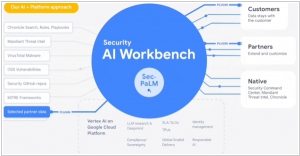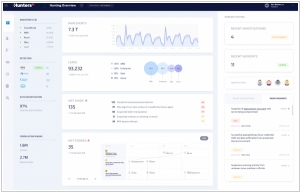AI for Enterprise Security
Updated: December 23, 2023
AI for Security is a revolutionary technology that leverages artificial intelligence and machine learning algorithms to enhance the detection and prevention of cybersecurity threats. By continuously analyzing vast amounts of data, AI-powered security systems can identify patterns and anomalies, enabling them to detect and respond to cyberattacks in real-time. These intelligent systems can detect new and evolving threats that traditional security measures might miss, offering a proactive approach to cybersecurity. Additionally, AI can automate the analysis of security events, freeing up cybersecurity professionals to focus on more strategic tasks. Moreover, AI for Security can adapt and learn from previous incidents, improving its accuracy and effectiveness over time. With the ever-growing sophistication of cyber threats, AI for Security plays a crucial role in fortifying digital defenses and ensuring the protection of sensitive data and critical systems in today's interconnected world.
See also: Top 10 Cloud Security Software
See also: Top 10 Cloud Security Software
2023. Guardz collects $18M to expand its AI-based security platform for SMBs

With the progression of artificial intelligence, the focus of cybercrime has extended to encompass small and medium businesses. Addressing the heightened demand for enhanced defenses in this sector, Guardz, an Israeli startup specializing in comprehensive security and cyber insurance solutions for SMBs, has successfully secured $18 million in a Series A funding round. Guardz's platform operates as a managed service, minimizing direct customer involvement, yet integrating substantial AI-driven automation. The tools within Guardz's arsenal autonomously identify malicious activities, offer remediation measures, and generate detailed activity reports for further analysis by managed service providers (MSPs). Additionally, Guardz facilitates the creation of customized security breach simulations tailored to specific SMB activities, aiding MSPs in employee training efforts.
2023. Nexusflow raises $10.6 to build a conversational interface for security tools

Nexusflow, a startup utilizing generative AI to assist companies in comprehending cybersecurity data, has successfully secured $10.6 million in a seed funding round. The company focuses on amalgamating information from diverse security knowledge sources and integrating with existing security tools through their APIs. By harnessing open-source large language models, which can operate within a customer’s firewall or in the cloud, Nexusflow empowers users to manage security software and access metrics and insights using natural language commands. Notably, both Google and Microsoft have recently introduced generative AI enhancements to their security product lines, aiming to simplify the process of extracting information from vast amounts of security data by enabling users to ask questions in plain language.
2023. Cloud camera security startup Solink raises $60M

Solink, a company specializing in physical security solutions for businesses, has raised $60 million. Back in 2016, Solink ventured into cloud video security by introducing a service-based offering that enhanced video feeds through integration with other systems, such as point-of-sales systems, thus providing valuable data insights. Today, Solink's platform empowers companies to carry out various security monitoring tasks with ease. This includes advanced features like motion detection across multiple cameras and seamless navigation between camera views, eliminating the need for knowledge of a site's physical layout. In specific industries like restaurants and retail, such as clothing stores, Solink claims to possess the capability to tag individual staff's interactions with customers. Additionally, it can monitor per-staff transactions for speed and size, or apply filters to identify "unusual" behaviors and movements, such as atypical foot traffic within a room. The company takes pride in its AI-powered threat identification system, enabling it to recognize potential risks like unauthorized access attempts and break-ins.
2023. Google brings generative AI to cybersecurity

Google has introduced Cloud Security AI Workbench, a suite of cybersecurity tools that uses a specialized AI language model called Sec-PaLM. This model is derived from Google's PaLM model but has been optimized for security purposes by incorporating security intelligence, such as research on software vulnerabilities, malware, threat indicators, and behavioral threat actor profiles. The Cloud Security AI Workbench offers various AI-powered tools, including Mandiant's Threat Intelligence AI, which uses Sec-PaLM to identify, summarize, and respond to security threats. VirusTotal, another Google property, will also utilize Sec-PaLM to help subscribers analyze and explain the behavior of malicious scripts. Additionally, Sec-PaLM will aid customers of Chronicle, Google's cloud cybersecurity service, in searching security events and engaging in "conservative" interactions with the results.
2023. DataDome, which uses AI to protect against bot-based attacks, raises $42M

As bots pose a significant threat to businesses by stealing content, inventory, and even committing fraud, it's not surprising that companies selling bot-fighting technology are receiving large investments. One such example is DataDome, which offers bot protection services for mobile apps, websites, and APIs and has raised $42 million in a Series C funding round. DataDome's platform uses machine learning to evaluate every request to a website, mobile app, or API, rather than relying on static rules to prevent bot-based threats. Other companies, such as Kasada, ThreatX, and PerimeterX, also use machine learning and proprietary platforms to combat online bots and prevent anomalous behavior in a fully automated manner.
2022. Securiti launches data security cloud with new funding $75M

Introducing Securiti, a startup that emerged in 2019 with a primary focus on data privacy. However, the company soon recognized the need to develop a comprehensive platform that addresses not only privacy but also data security, governance, and compliance. Today, Securiti has unveiled its all-encompassing data security cloud solution called DataControls Cloud, alongside the announcement of a successful $75 million Series C funding round. The fundamental concept behind the data security cloud is to establish a layer of data protection regardless of its location, be it within major cloud infrastructure providers like AWS, Microsoft, and Google, data infrastructure platforms such as Snowflake or Databricks, or even SaaS applications like Box or Salesforce.
2022. Google is acquiring security intelligence firm Mandiant for $5.4B

Google has announced its acquisition of Mandiant, a security intelligence company, which will grant Google access to advanced security data gathering capabilities and a team of experienced security consultants. Following the completion of the acquisition, Mandiant will be integrated into Google Cloud. Mandiant is dedicated to ensuring the security of every organization against cyber threats and instilling confidence in their preparedness. The company's distinctive approach combines machine intelligence, adversary insights, and operational cyber threat intelligence to gain a comprehensive understanding of the attack lifecycle. This enables proactive protection against the pertinent threats that organizations may face, aligning with Google's commitment to enhancing security measures.
2022. Virtual CISO startup Cynomi raises $3.5M to help SMBs automate cybersecurity

Cynomi, an Israeli cybersecurity startup, has secured $3.5 million in seed funding for its innovative virtual CISO platform tailored to small and medium-sized businesses (SMBs) and service providers. Typically, virtual CISO (vCISO) services involve engaging outsourced or on-demand security professionals who function remotely as part-time contractors, offering cybersecurity expertise and guidance to organizations. Cynomi takes a unique approach by eliminating the human element and leveraging artificial intelligence (AI) technology to emulate a human CISO, thereby automating previously manual operations. With this platform, Cynomi revolutionizes the cybersecurity landscape, providing SMBs and service providers with AI-powered assistance and guidance for enhanced security measures.
2021. Cequence adds $60M Series C to improve API security

Cequence Security, a company that recently concluded a $17 million Series B funding round, initially focused on safeguarding business logic. While it continues to address that aspect, Cequence has now redirected its attention to API security, resulting in the announcement of a $60 million Series C funding round. The startup observed an increasing number of vulnerabilities arising from APIs among its customers, prompting them to pivot the Cequence analytics engine towards identifying and addressing such vulnerabilities. By examining approximately 150 data points, Cequence assesses whether the detected activity raises concerns.
2021. Attack surface management startup CyCognito raises $100M

CyCognito, a startup dedicated to mitigating cyber attacks, has successfully secured $100 million in Series C funding. While operating as an attack surface management company, CyCognito distinguishes itself from others in its field through its comprehensive approach. By employing machine learning-based attack surface management, it thoroughly assesses a company's range of assets, identifying potential security gaps. Notably, CyCognito is the pioneering company capable of automating security testing on a massive scale, encompassing millions of assets.
2021. Voxel raises $3M to make warehouse security cameras more safety conscious

Warehouses and distribution centers are equipped with extensive security camera coverage, but much of the recorded footage remains unexamined unless actively monitored. Voxel aims to revolutionize this situation by introducing its on-premises pixel-peeping machine-vision robots to conduct meticulous inspections and promptly alert managers if any issues arise. The company has recently secured a $3 million seed funding round to further develop its technology and expand its services beyond the initial group of beta customers. Voxel operates on a hybrid architecture, where initial analysis and computer vision tasks are performed by an on-premises computer. If a safety event is detected, the relevant data is uploaded and made accessible through the SaaS online dashboard.
2020. Palo Alto Networks to acquire AI cybersecurity firm Expanse for $800M

Palo Alto Networks has completed the acquisition of Expanse for a total of $800 million. Expanse offers a valuable service that assists companies in comprehending and safeguarding their attack surface, identifying potential vulnerabilities to attacks. By providing the security team with insights into how the company's security profile might appear to an attacker attempting unauthorized access, Expanse enhances overall defense. The strategic integration plan involves incorporating Expanse into Palo Alto's Cortex Suite, a collection of AI-driven tools specifically designed for automated attack detection and prevention. Leveraging Expanse's extensive data resources, Palo Alto aims to further enhance its AI models, ultimately strengthening its overall security capabilities.
2020. Hunters raises $15M for its AI-based threat-hunting platform

Hunters, a cybersecurity startup headquartered in Tel Aviv, specializes in assisting enterprises in defending against intrusions and analyzing cyber attacks. The company has recently secured a $15 million investment in a Series A funding round, with participation from Microsoft and other investors. By leveraging its SaaS platform, Hunters automates the traditionally manual process of threat hunting. The core concept revolves around leveraging data from an enterprise's diverse networking and security tools to identify stealth attacks.

